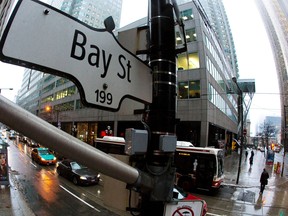Soaring inflation shatters Bay Street consensus on interest rate liftoff

Some now say we could see borrowing costs rise as early as next week

Article content
This week’s inflation numbers have ruptured the Bay Street consensus on when the Bank of Canada will next raise interest rates.
Advertisement
Story continues below
This advertisement has not loaded yet, but your article continues below.
Article content
Bank of Nova Scotia’s forecasting team, led by chief economist Jean-François Perrault, predicts a quarter-point liftoff next week when the central bank releases its next quarterly report on the economy. Perrault thinks inflation, which accelerated to its fastest pace in more than 30 years in December , will force the central bank to raise its benchmark rate to two per cent by the end of the year from 0.25 per cent currently.
That would be aggressive, especially considering the world still is learning to cope with a pandemic, other economists said. An interest-rate increase next week could bruise the central bank’s credibility, given it signalled last fall that it wouldn’t alter borrowing costs before the spring, said Jimmy Jean, chief economist at Desjardins, the Montreal-based co-operative.
Advertisement
Story continues below
This advertisement has not loaded yet, but your article continues below.
Article content
Even worse, Tiff Macklem, the central bank’s governor, could find himself in the middle of a public-relations crisis if it moves to slow economic growth when much of the country is in partial lockdowns due to rampant COVID-19 infections, said Benjamin Tal, deputy chief economist at Canadian Imperial Bank of Commerce.
“We think that taking this meeting to tweak the forward guidance would preserve the credibility of it,” Jean said by email. “Forward guidance is a very important tool when we are at the lower bound of interest rates and the effectiveness of forward guidance lies in its credibility.”
In its last Monetary Policy Report in October, the central bank said it wouldn’t start lifting rates until sometime in the middle quarters of 2022, which was roughly when its forecasts had economic output returning to the level that the central bank associates with the economy’s non-inflationary speed limit.
Advertisement
Story continues below
This advertisement has not loaded yet, but your article continues below.
Article content
The forecasts that Macklem and his deputies will be assessing this week ahead of the release of their next interest-rate decision on Jan. 26 will look much different than they did in the fall.
Statistics Canada reported on Jan. 19 that the consumer price index increased 4.8 per cent in December from a year earlier, the biggest increase since 1991 and well off the central bank’s target of two per cent. The report prompted some economists to immediately change their interest-rate forecasts.
Veronica Clark at Citigroup Capital Markets Inc. joined Scotiabank in predicting a quarter-point increase next week, followed by increases of the same magnitude in April, July, and October. Charles St-Arnaud, a former Bank of Canada economist who now works at Alberta Central, advanced his call for the first hike since the start of the pandemic to March, siding with those who think it would be a mistake for the central bank to defy its previous guidance.
Advertisement
Story continues below
This advertisement has not loaded yet, but your article continues below.
Article content
“We believe the Bank of Canada will raise rates sooner rather than later; there is a risk this increase could come at the January meeting,” St-Arnaud said in a note to his clients. “Two factors are likely to hold back the BoC from raising rates next week,” he added. “The uncertainty to the near-term outlook caused by the Omicron wave and the possible decline in economic activity associated with it, and raising in January would go against the current forward guidance.”
Inflationary pressures are expected to become more entrenched this year, according to the Bank of Canada’s fourth quarter Business Outlook Survey . More than two-thirds of businesses report that they expect inflation to track above three per cent over the next two years while more than 70 per cent of businesses also expect to raise wages over the next 12 months. Gross domestic product will take a hit from Omicron, but the economy had lots of momentum heading into the new year, and record job vacancies suggest there’s plenty of demand, economists said.
Advertisement
Story continues below
This advertisement has not loaded yet, but your article continues below.
Article content
Still, the men and women who get paid to interpret what the Bank of Canada is thinking differ on when exactly Macklem and his deputies will start to apply the brakes. It’s an unusual split for a group that tends to see things roughly the same way.
“We think it makes more sense to lift rates now to ensure that longer-term inflation expectations remain reasonably well-anchored,” Andrew Kelvin, chief Canada strategist at TD Bank, said in an email.
Tal of CIBC said it’s a “50-50” chance that rates will go up in January. “The market is giving the Bank of Canada the green light to move next week and they might go for it to not be seen as being behind the inflation curve,” he said by email. “The only thing that might hold them back is PR considerations, namely, hiking in the middle of the Omicron wave when there are still restrictions.”
Advertisement
Story continues below
This advertisement has not loaded yet, but your article continues below.
Article content
Both Bank of Montreal and the National Bank of Canada anticipate that Macklem will opt to tee up a March increase at next week’s meeting. Royal Bank of Canada is the only major bank that’s sticking to a prediction that the central bank will wait until April to begin raising interest rates.
Jean at Desjardins acknowledged that a January hike is a possibility, but he doubts Macklem will pull the trigger. “There wouldn’t be too much of a cost for delaying by six weeks given what we know about the time lags before monetary policy has an impact on demand,” he said.
• Email: [email protected] | Twitter: biancabharti
Advertisement
Story continues below
This advertisement has not loaded yet, but your article continues below.





